Keke Palmer Is Redefining Her Legacy
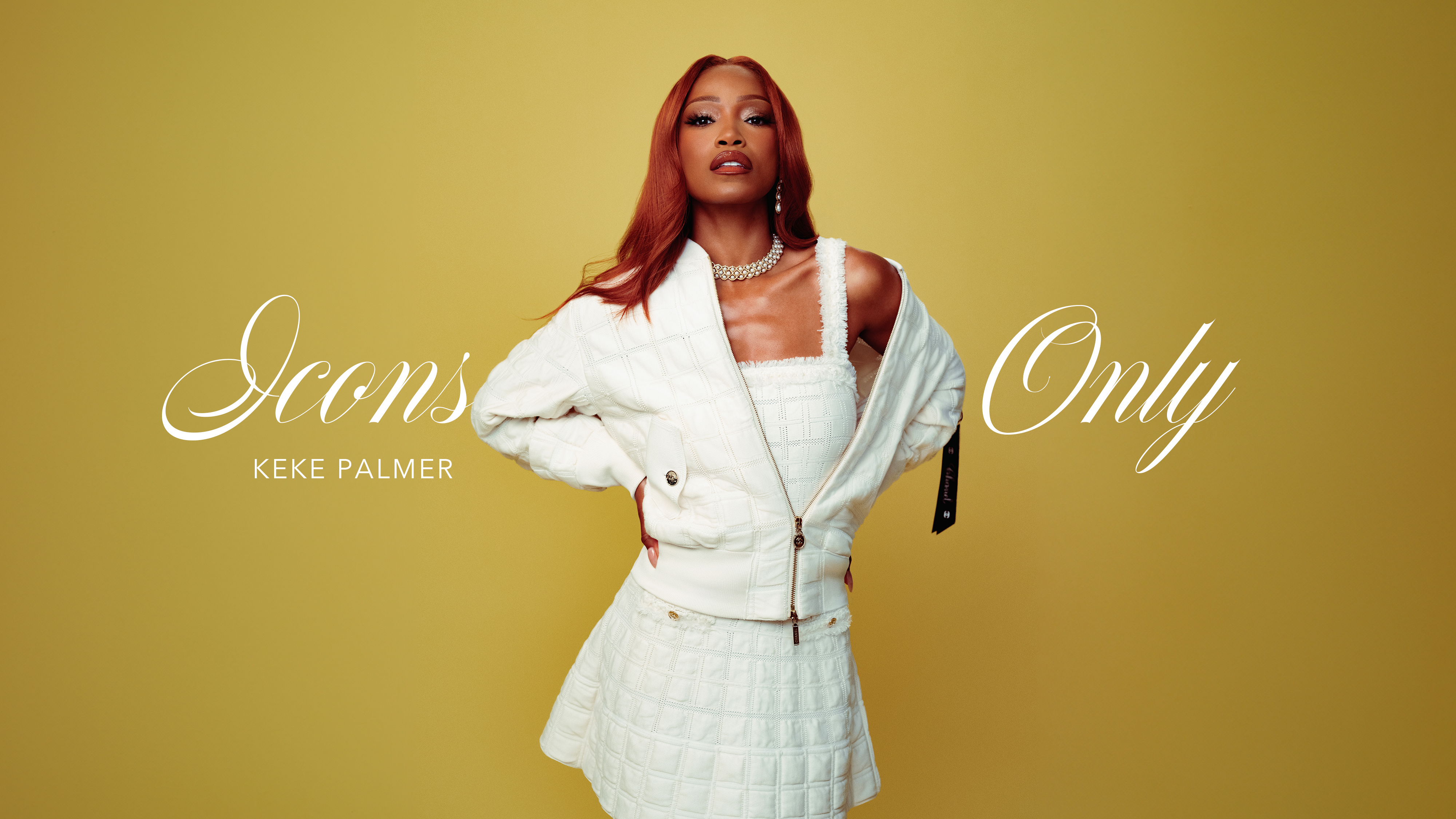
Since last night, Keke Palmer has been on the move. It's Tuesday afternoon, and she just got back to Los Angeles from a turnaround trip to Las Vegas. After arriving in Sin City late Monday evening, she squeezed in a few hours of rest before slipping into hair and makeup at 4:30 a.m. to glam up for an appearance at the Starbucks Leadership Experience, where she hyped up coffee makers competing in a global barista competition. By 9:00 a.m., she was on the road again, heading to the Universal Studios lot back in L.A. to shoot the final episode of season 1 of The 'Burbs, her upcoming Peacock series based on the 1989 cult-classic film of the same name.
Now, tucked in her trailer before stepping on set to film, she chats via Zoom. Despite her laid-back appearance—a gray Abercrombie & Fitch Super Bowl LIX sweatshirt, black-rimmed glasses, modest silver hoops, and a flawless no-makeup makeup look—Palmer's vibe is anything but. Her energy is up, and she's radiating pure, unwavering drive. "Even though it was a lot for today, I wanted my weekend off," she says of opting to keep it pushing and shoot today after getting up so early. "I said, 'I'll come in on my day off to finish up—finish strong.'"
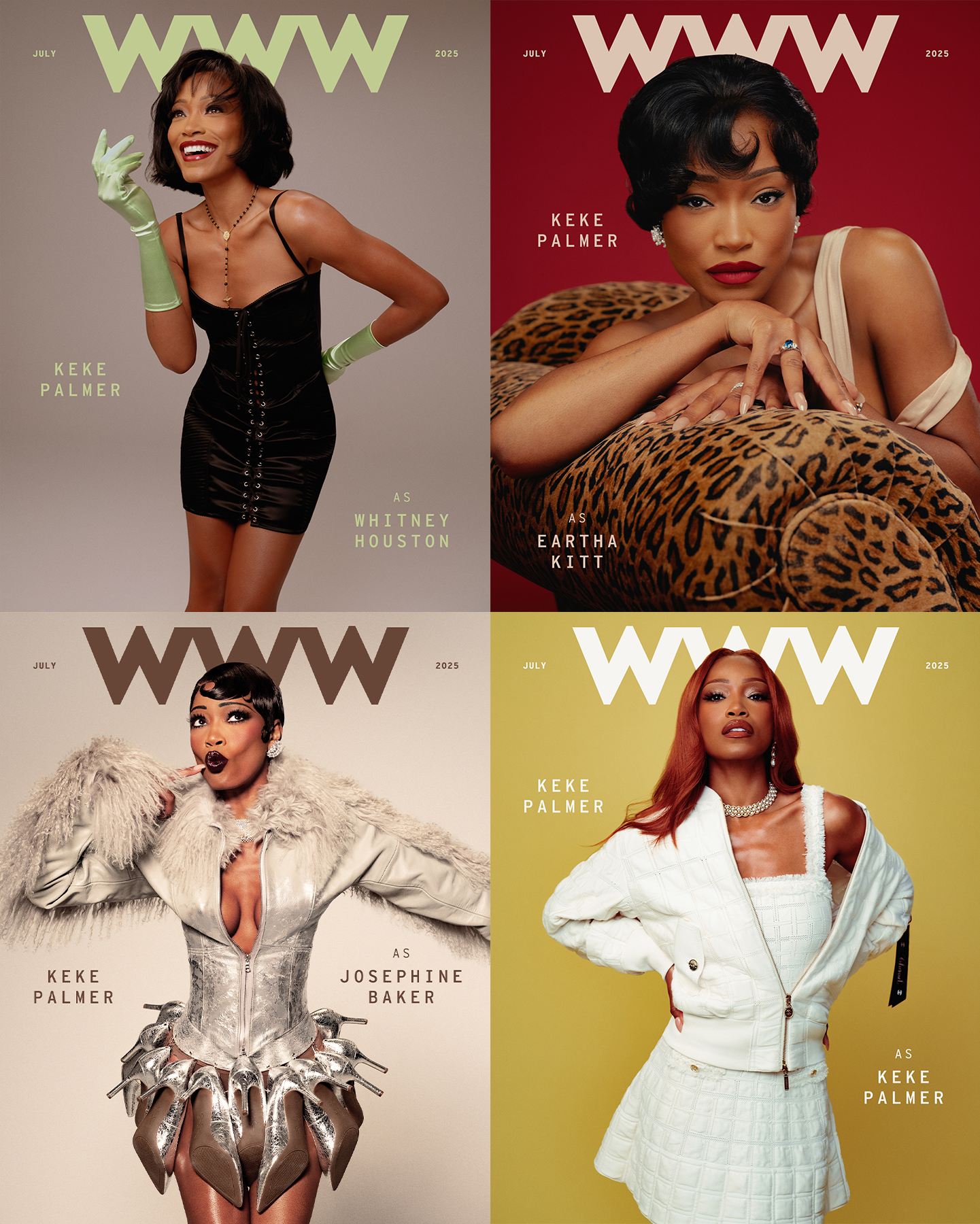
Palmer is on a mission. She's determined to leave her mark on the entertainment industry as a trailblazer who acts, produces, sings, writes, and manages her own enterprise. These ventures require a lot of hustle, and she's here for it. "Anytime I am seen as a millennial diva, cultural phenomenon, prodigy, any of these titles somebody can throw out—I take it with so much pride," she says, tucking her sleek, chin-length bob behind her ears. "What I see my legacy to be is hopefully something that is a launching pad for others. I want nothing more than to do what I can when I can [and] to represent something positive the best I can."
Since stepping into the spotlight as the inspiring title character in 2006's Akeelah and the Bee, the 31-year-old, born Lauren Keyana Palmer, has evolved into one of Hollywood's most dynamic talents. After cementing her status as a child star with the lead role in the Nickelodeon sitcom True Jackson, VP, she's gone on to star in hits like Hustlers, Nope, and One of Them Days. The sequel of the latter is in the works with Palmer—back to produce with Issa Rae—reprising her lead role in the buddy comedy alongside SZA. She's done all this while making history as the first Black woman to win an Emmy for Outstanding Host for a Game Show for her work on NBC's Password and releasing her New York Times best-selling memoir, Master of Me: The Secret to Controlling Your Narrative.
On the strength of her desire to triumph in show business, Palmer's slate remains packed. Her podcast, Baby, This Is Keke Palmer, is currently in its second season. This summer, she not only stars in Amazon MGM Studios' heist comedy The Pickup alongside Eddie Murphy and Pete Davidson, but she also released one of her most personal projects yet, her album Just Keke.
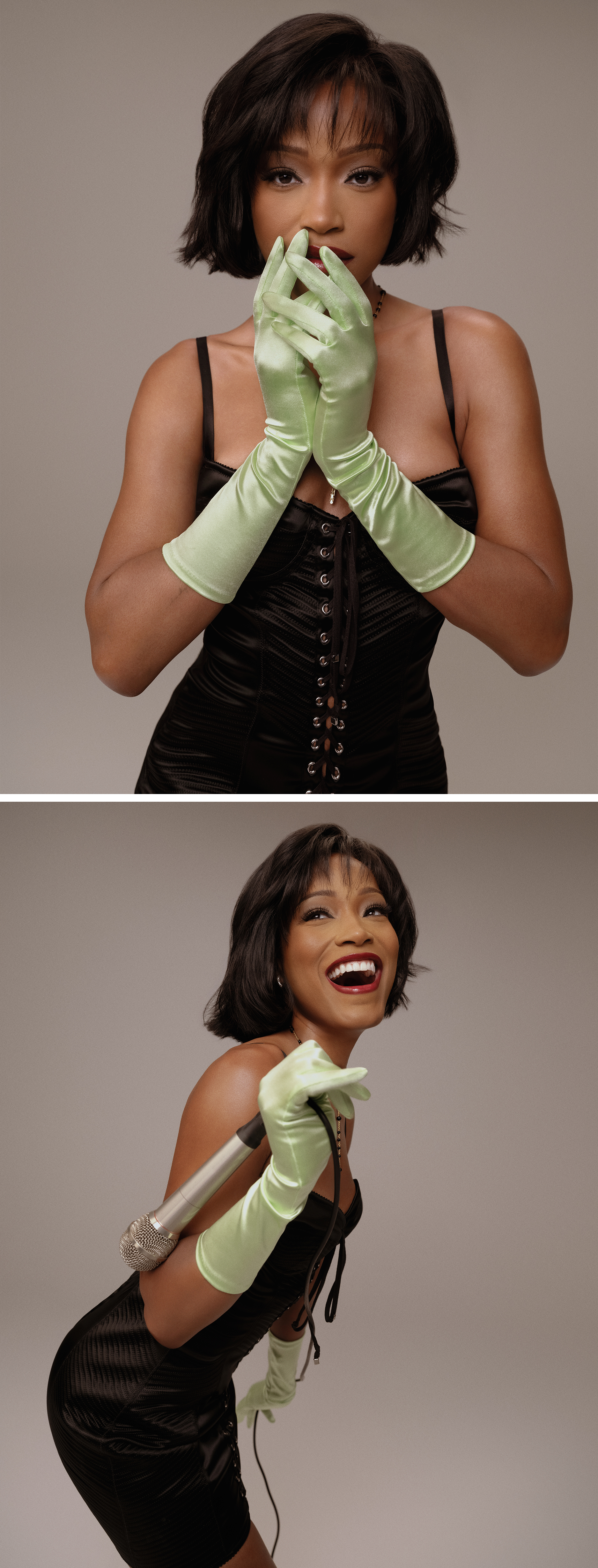
When Palmer began crafting her third record in early 2024, she knew she had a lot to say on it, but for the first time in her career, she wasn't sure how to get her point across. "I hadn't fully closed in on what my conversation was surrounding everything I had gone through that past year with my son and with my son's father," she admits. To tell her story through searing lyrics, she enlisted her longtime bestie Tayla Parx, who cowrote Ariana Grande's "Thank U, Next," Khalid and Normani's "Love Lies," and Panic! at the Disco's "High Hopes." "I knew she would be able to help [me] say what I needed to say for this album at this particular time in my life," Palmer says.
Back in the summer of 2023, Palmer's relationship with ex-boyfriend Darius Jackson, with whom she welcomed son Leodis in February of that same year, became a focal point in the public eye following an incident at an Usher concert. The moment sparked a wave of media attention after Palmer's attire—a lace bodysuit—at the show was met with criticism from Jackson, an exchange that played out on social media. "It's the outfit tho.. you a mom," he wrote on Twitter. Four months later, Palmer filed a restraining order against Jackson, accusing him of domestic violence.
The legal action marked a significant turning point for Palmer, not only highlighting the complexities of personal struggles intertwined with public life but also forcing her to confront how she'd been processing her emotions. "I've had public moments that were embarrassing or humiliating [in the past], but they were not this," Palmer says, reflecting on the emotional toll of having her personal life laid bare for the world. "They were not something that felt this invasive and exposing."
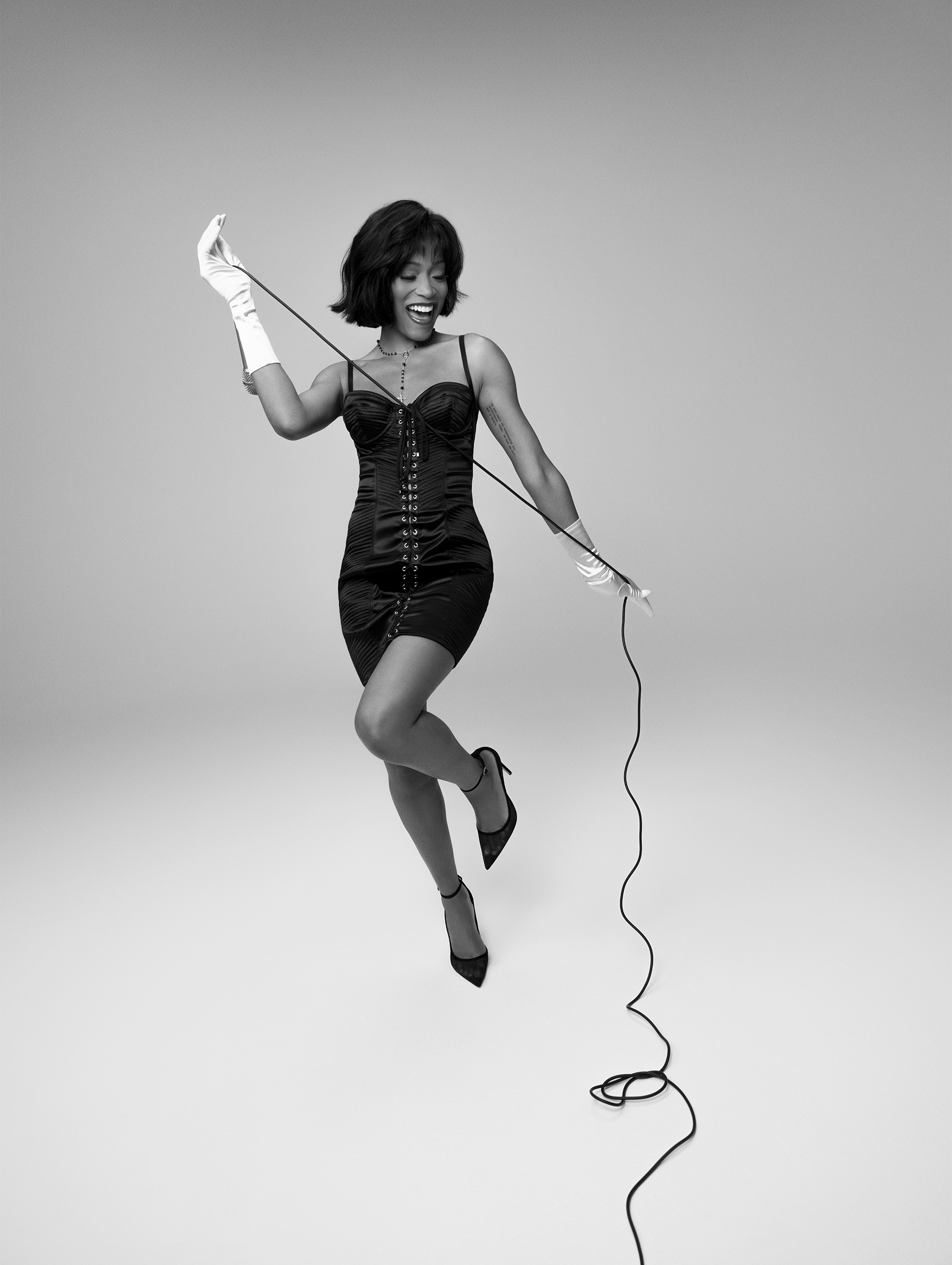
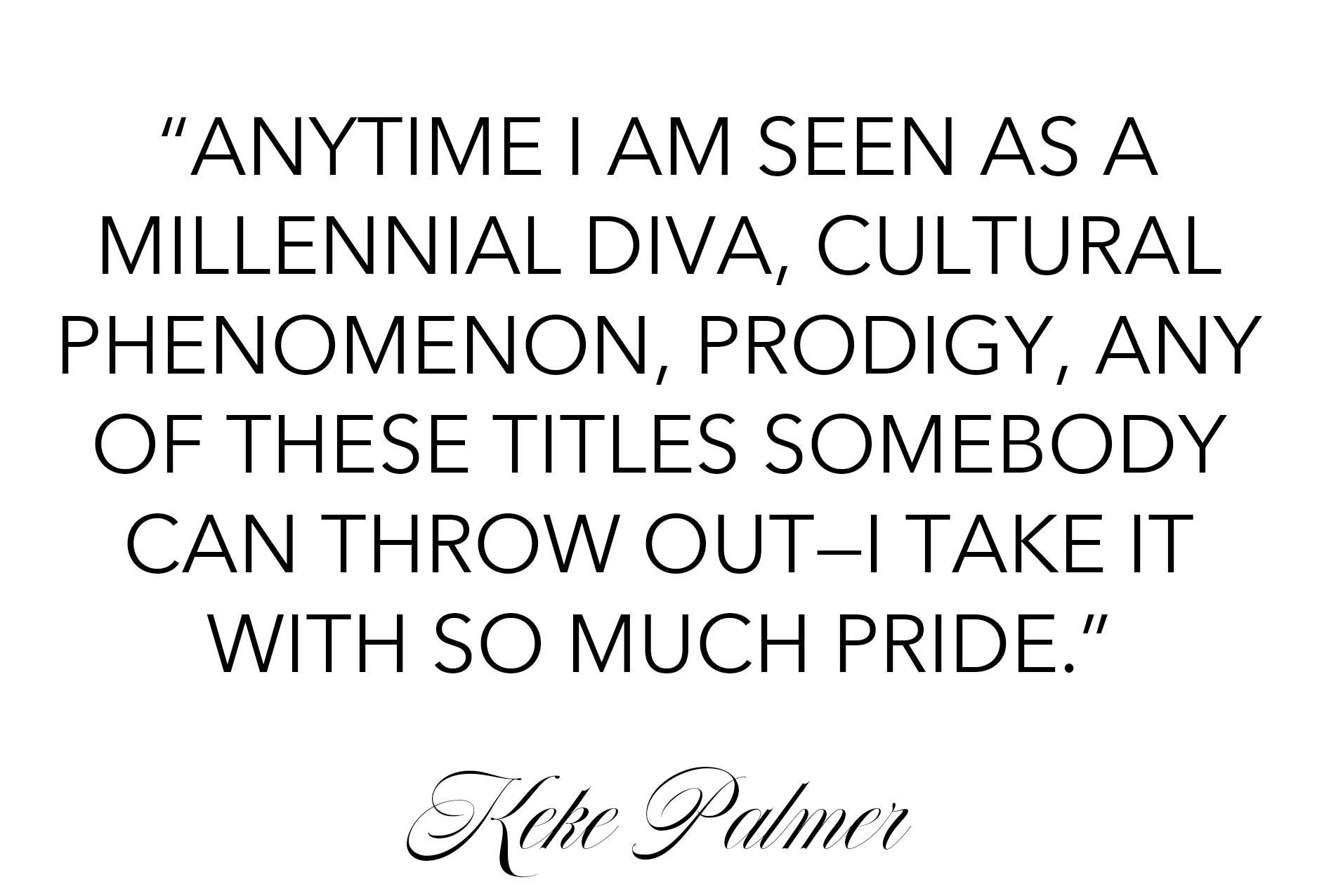
For years, Palmer had carefully cultivated an image built on positivity, always striving to approach life with optimism and a "glass half full" mentality. "I process life through the frame of joy. That's a choice," she says. But as her relationship unraveled in the public eye, Palmer faced the reality that her carefully maintained façade was crumbling. She questioned how to make sense of her pain while still maintaining the strength and grace she'd built her career on. "How do I process what feels ugly and still be able to say 'I feel beautiful' at the end of the day?" she remembers asking herself. Making her R&B album, Just Keke, encouraged her to face this reality: "I have to go through the ugly, and it doesn't make me ugly," she explains.
Through her music, Palmer began to confront the hurt head-on. The first two songs she recorded for her album—the trap-leaning "Misunderstood" and the groovy, '90s-feeling "Off Script"—became the project's emotional core. They encapsulate the anger, sadness, and reinvigoration Palmer felt as she processed her pain, let go of her relationship, and began to reclaim her power. "I didn't realize how much I was holding in, how much I was trying to keep [it] all together," she admits. "But I had to accept the fact that sometimes life is going to life. No matter how much I try to wrap it up and make sense of it, sometimes it's going to go off script."
Making her album became a way to vocalize her frustrations, not just from her heartbreak but also from feeling insecure and, as she describes it, "disconnected from [herself]" after becoming a mom. "Something happens to you after you have a child. Hormonally, you're just so out of whack," she says. "You don't know this new version of who you are." The changes of motherhood only made the demise of her relationship more difficult to endure. "Not only did the love fail, but it failed at a moment when I couldn't even trust myself enough to stand on my own feet," she explains.
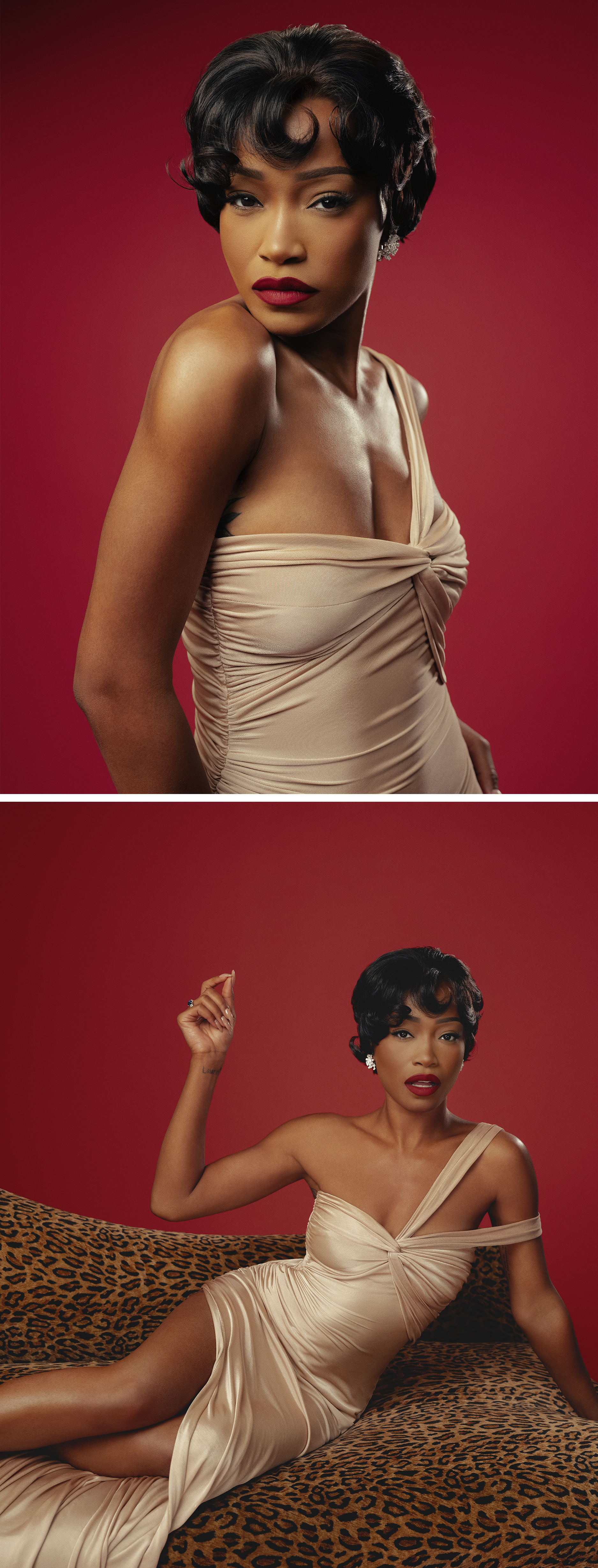
Stepping into the recording studio didn't just help Palmer find herself again; it also led her to embrace a new mindset—one that allowed her to drop the pressure she'd put on herself to maintain a lighthearted persona. Before she began working as a child actor, Palmer says she mastered the art of performing, particularly comedically, to mask her inquisitive nature. "As a kid, I was always looking at things from this objective point of view," says the middle child between three siblings who grew up in the southern suburbs of Illinois to a teacher mother and a father who worked for a polyurethane company. "Especially in a lower-income area, you start asking questions like, 'Are you sad, Mama? Do we have what we need?'"
After noticing that her inquiries either worried her folks or made them feel uncomfortable, she switched up her approach, conversely cracking jokes: "I learned to dampen [my questions] just enough and instead started saying, 'I guess we ain't going to eat tonight.' You start joking around to say what you want to say without spooking people." As she began booking acting gigs, Palmer—whose stage name, Keke, originated as a family nickname—used humor to connect with people. "When I would get a job, even when I would play a dramatic role, people would see the humorous side of me. Comedy has always been a unifier for me," she says.
It's also been a shield. "I remember being a young person and deciding I was going to be tough, strong, have fun, be grand," she says. Always forcing herself to be entertaining and "on" meant she wouldn't reveal her vulnerable side—the side that would lead her to admit, "I'm tired. I love this, but I don't want to do this right now," she remembers. "Our performative selves are defense mechanisms. We are all performing something."
The duality of her public identity versus her private reality has left Palmer feeling fragmented, she says. "My performative self is very grandiose," she describes. "She's very feminine, flamboyant, super, and big. She's going to get your attention, and she's going to keep you watching. Lauren Palmer, the real me, sometimes I'm quiet—not because I don't have anything to say but because I'm reserving my voice. I'm watching, and I'm observing. I'm watching how people relate to me and how I'm relating to them." She remembers working on a Nickelodeon cruise as a kid and wishing she could perform in a SpongeBob suit to cover herself completely. That way, when the suit came off, she could just be Lauren. "I remember being like, 'I'm not able to turn people off from seeing me as a character. I don't have an off button,'" she recalls.
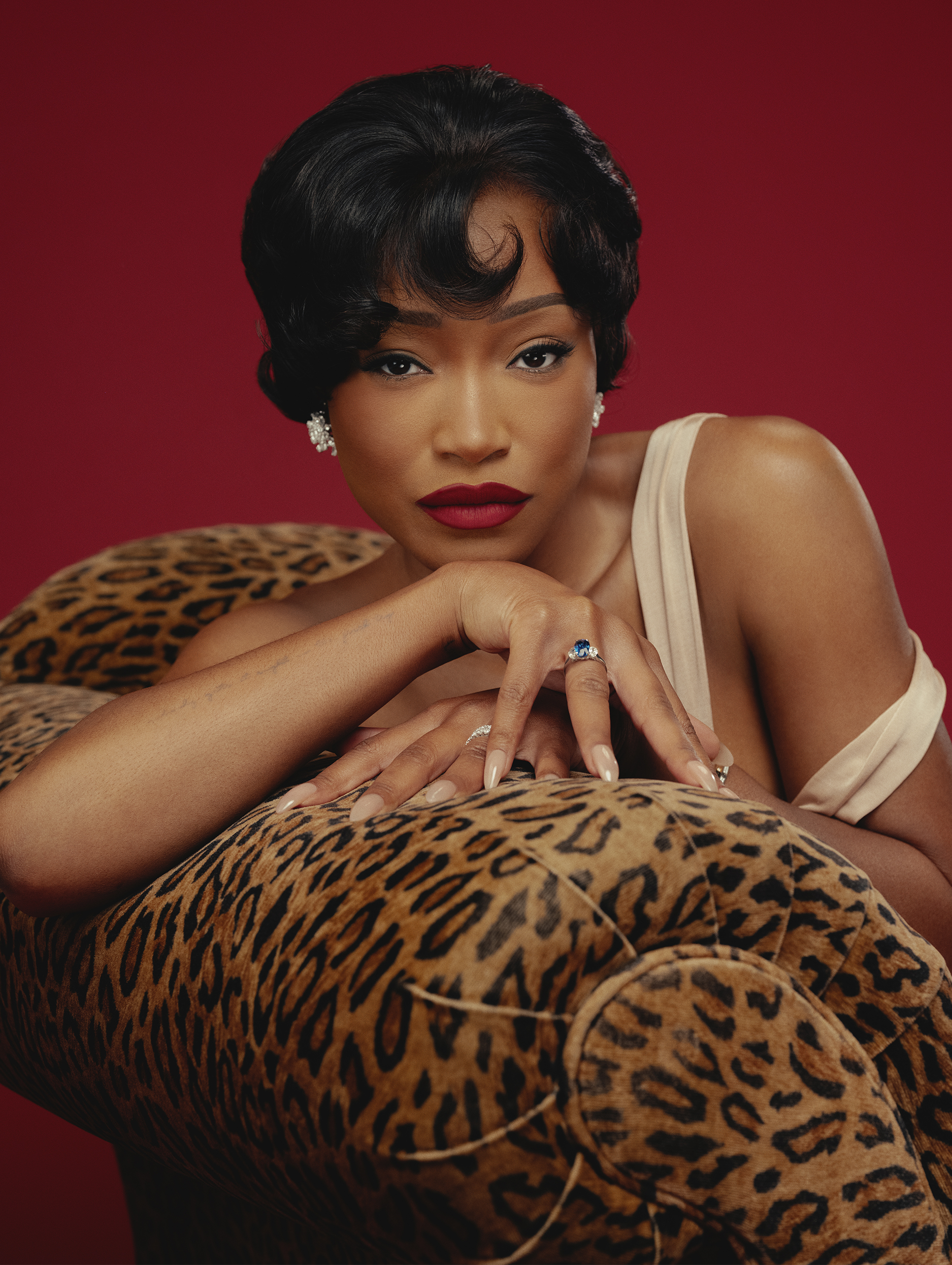
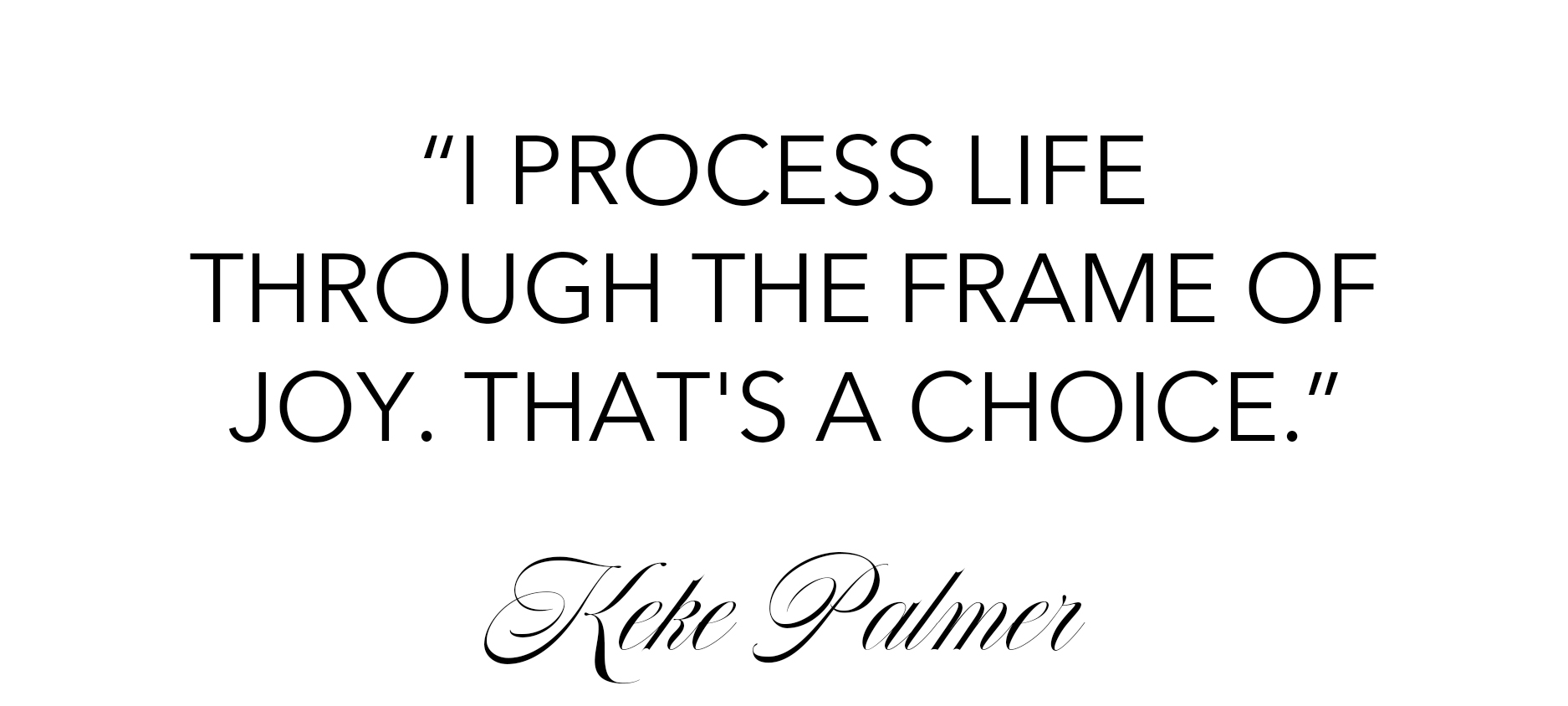
When Palmer shot The Pickup, she noticed costar Eddie Murphy's ability to maintain a sense of self-preservation, and she admired it. "He's so lovely, but he is very quiet, which I relate to as a person who does a lot of comedy," she says. "Your resting baseline for preservation is reserved because you want to be able to have something to give." Palmer observed that even though Murphy was very serious at times, "it didn't mean he wasn't kind." She adds that watching how Murphy "plays to the truth of a crazy situation" in a scene taught her a lot about how to ground her own comedic performance. "It honed in on what my mom used to always teach me about comedy, which is that comedy stems from reality. Just speak to the truth of the moment. No one does that better than Eddie Murphy," she explains.
For Palmer, few entertainers have mastered the art of establishing limits as well as Murphy. "You have to think about it; he was 19 years old [when he got a] three-picture deal with Paramount. At 18 years old, he was already [a cast member] of SNL. This story that I'm telling about fragmentation and performance, he wrote the book on it. I respect the boundaries he's created that have allowed him to preserve, to be a real person outside of being the man that gave us Boomerang," she says.
Palmer is all about setting those boundaries too. Now, more than ever, she wants people to understand that there is a "difference between [Keke Palmer] the human being and [Keke Palmer] the public persona, the performer, and the artist that is essentially a product," she says. She's enforcing this through the raw lyrics on her album as well as the cover art of her project. On the cover, Palmer presents as a doll—she's positioned in a mechanical stance and is being held up by a display stand. This image of Palmer as a figurine is a striking metaphor for the pressure she has felt to constantly be a version of herself that the world can consume.
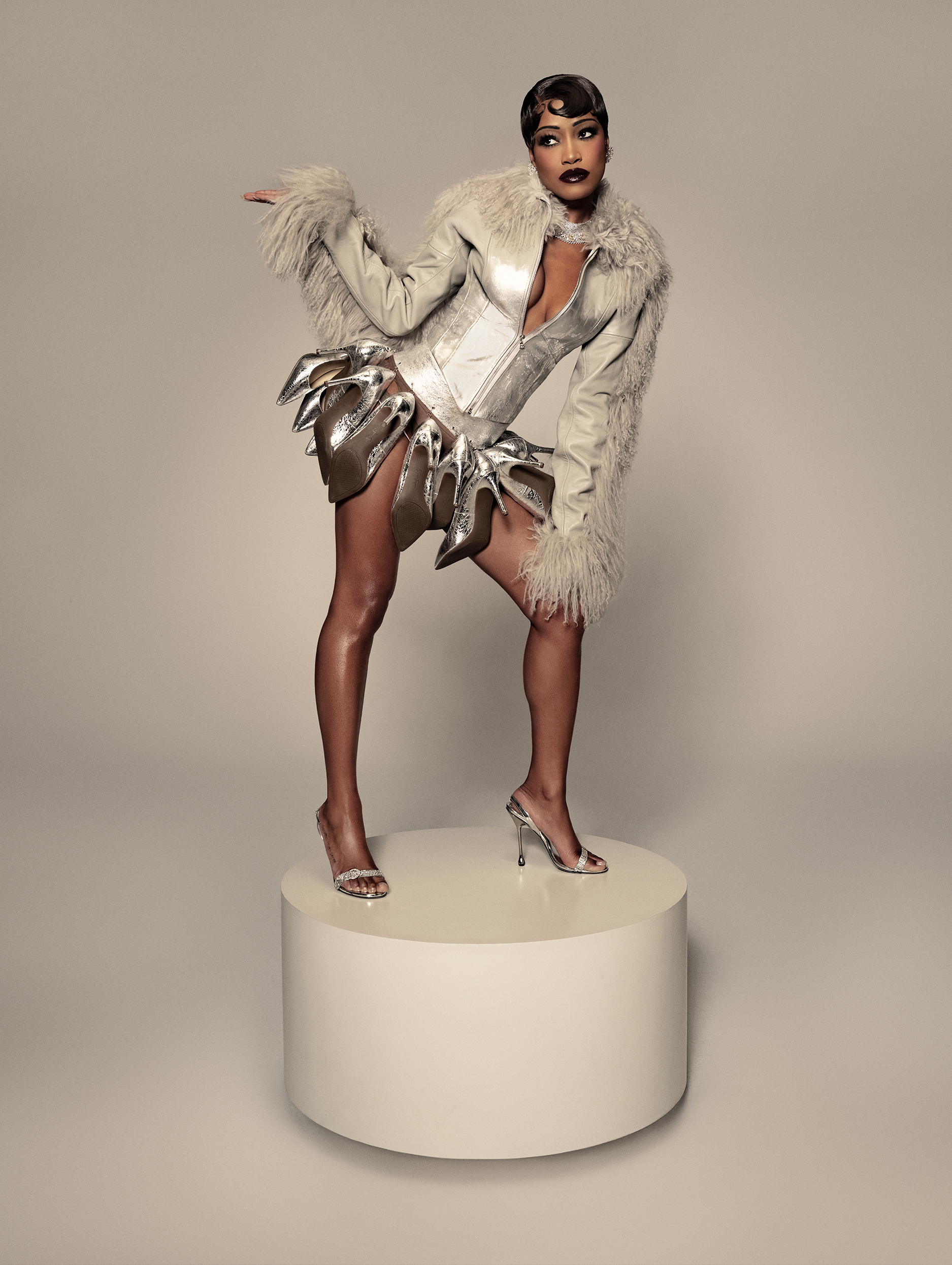
This awareness of the need for boundaries has also led Palmer to seek out moments of solitude and self-care. She has found peace in rituals that allow her to reconnect with her true self away from the spotlight, like journaling, Pilates, and prayer. "I grew up in the church, so that relationship with self that comes through prayer practice is a big grounding force," she says. She also goes on solo walks and wellness retreats to ensure she's "doing things where [she's] by [herself]" and makes sure to carve out "me" time at the top of her day. "I make my mornings a moment to just spend time with me to make sure that I have time before work begins to validate my existence outside of the job," she says.
Palmer's journey of self-discovery and strength is also reflected in the powerful images for this cover story. In the shoot, she stepped into the shoes of the iconic Black women who have inspired her: Whitney Houston, Eartha Kitt, and Josephine Baker. To Palmer, embodying these icons was not just about mimicking their looks—it was about capturing the essence of their impact. "These women found a way to articulate themselves in a world that had no space for them," she says. "They were always so much more than what the world wanted them to be."
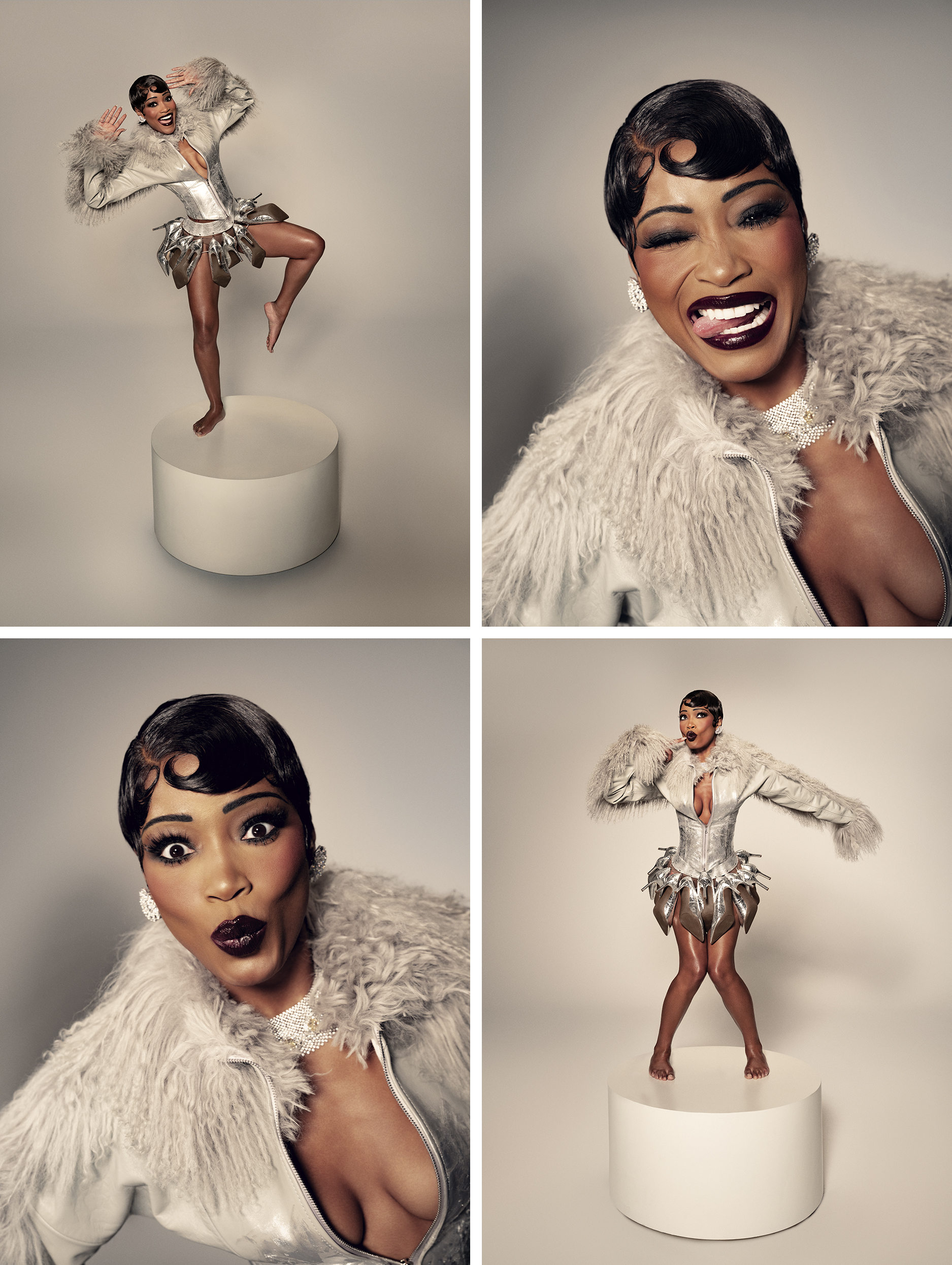
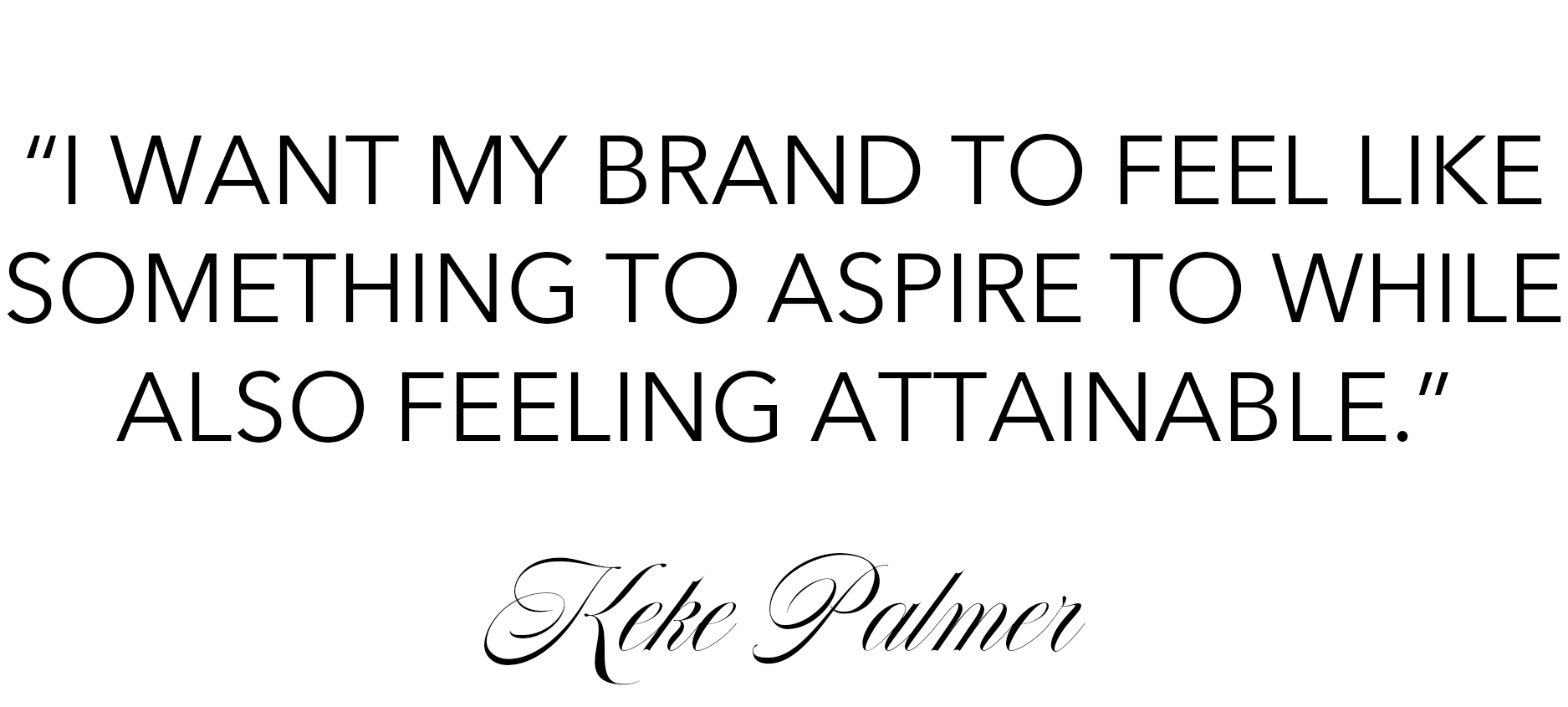
Her words underscore the resilience of Black women who, despite the systemic racism and cultural barriers they faced, carved out space for their voices, talents, and identities. They not only redefined what it meant to be a Black woman in entertainment, but they also paved the way for future generations to assert their presence in spaces where they were once silenced or overlooked. "And they did it so perfectly," she adds. "To be able to have something so signature, so iconic about you that people can put it on and immediately get into your vibe—that's somebody that was able to embody or express who they were through image and performance. I think that's what every artist wants to do."
Seeking inspiration from the moves of trailblazers also fuels Palmer's entrepreneurial spirit. Her digital network, KeyTV, is dedicated to amplifying the voices of creators of color in entertainment, and she draws from the legacies of moguls like Estée Lauder, Queen Latifah, Walt Disney, and Tyler Perry to inform her vision. "I think about what a brand can stand for outside of the person," she says. "What their brands represented became universal. You see a whole community and culture being uplifted, guided, and being able to evolve because of what that brand represented. I hope to do the same. When I came into the industry, my parents always said, 'It has to be more than just you. You have to be performing for something, and it should be your community.' They would talk to me about how to use what I do to make it something that can be of service to others. I want to continue to bring joy into our community and for us to thrive together. Never forget where you came from."
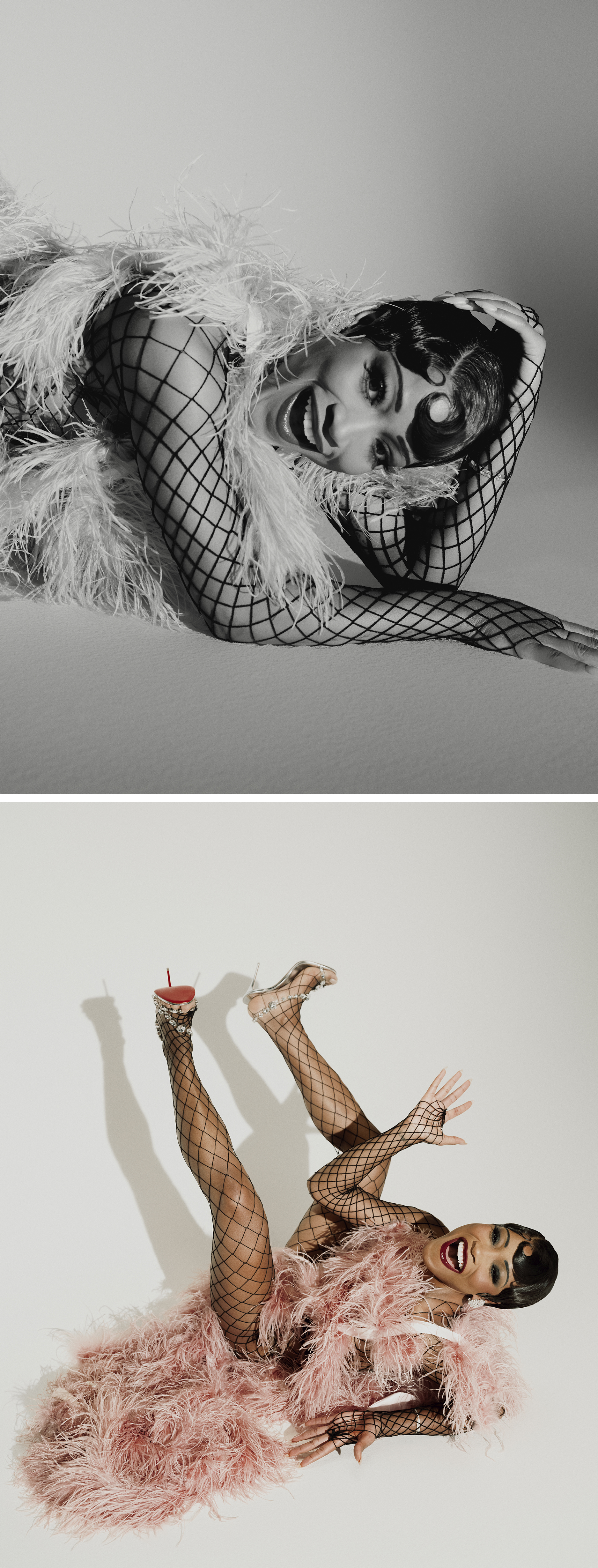
As Palmer continues to define herself on her terms, she has been working with stylist Molly Dickson, who she says "knows how to take what's being desired and bring it to another level." Palmer's evolution extends beyond her music and personal life—it's reflected in how she expresses herself through fashion. "I want my brand to feel like something to aspire to while also feeling attainable," she says. She recalls the stunning Chanel Haute Couture F/W 93 LBD she wore to the BET Awards in June, a look that balanced youthful energy with an air of esteem. "That was casual and cool, something that felt movable, flirty, and young but also has this element of prestige—that's how I see myself and my brand," she says.
She adds that Dickson, who also styles Sydney Sweeney and Lana Del Rey, understands that the look Palmer wore to the award show (as well as the fly 2004 Versace dress with a sheer bodice, a flowy wrap skirt, and Messika diamond accents she wore to the 2025 Vanity Fair Oscar Party in March and the striking orange S/S 03 Christian Dior by John Galliano Haute Couture gown with a feathered hem she wore to the 2025 Essence Black Women in Hollywood Awards in February) "speaks to where we're going and the level of intent that [she's] having behind fashion and what [she's] trying to say with it as a Black woman existing in this space. This is stuff straight off the haute couture runway. This is not a thing you can easily get access to."
This sense of assertion and confidence is also reflected in her close collaboration with designer Sergio Hudson, who teamed with Dickson to style Palmer in a dramatic Vera Wang suiting look for the 2025 Met Gala. "Sergio taught me how to use glam fashion as a place of refuge," she says about how teaming with Hudson changed her feelings toward fashion. "Sometimes, fashion and glam would be annoying to me because it was always kind of wanting me to be something and needing me to be something. I always felt like I was never fitting the task."
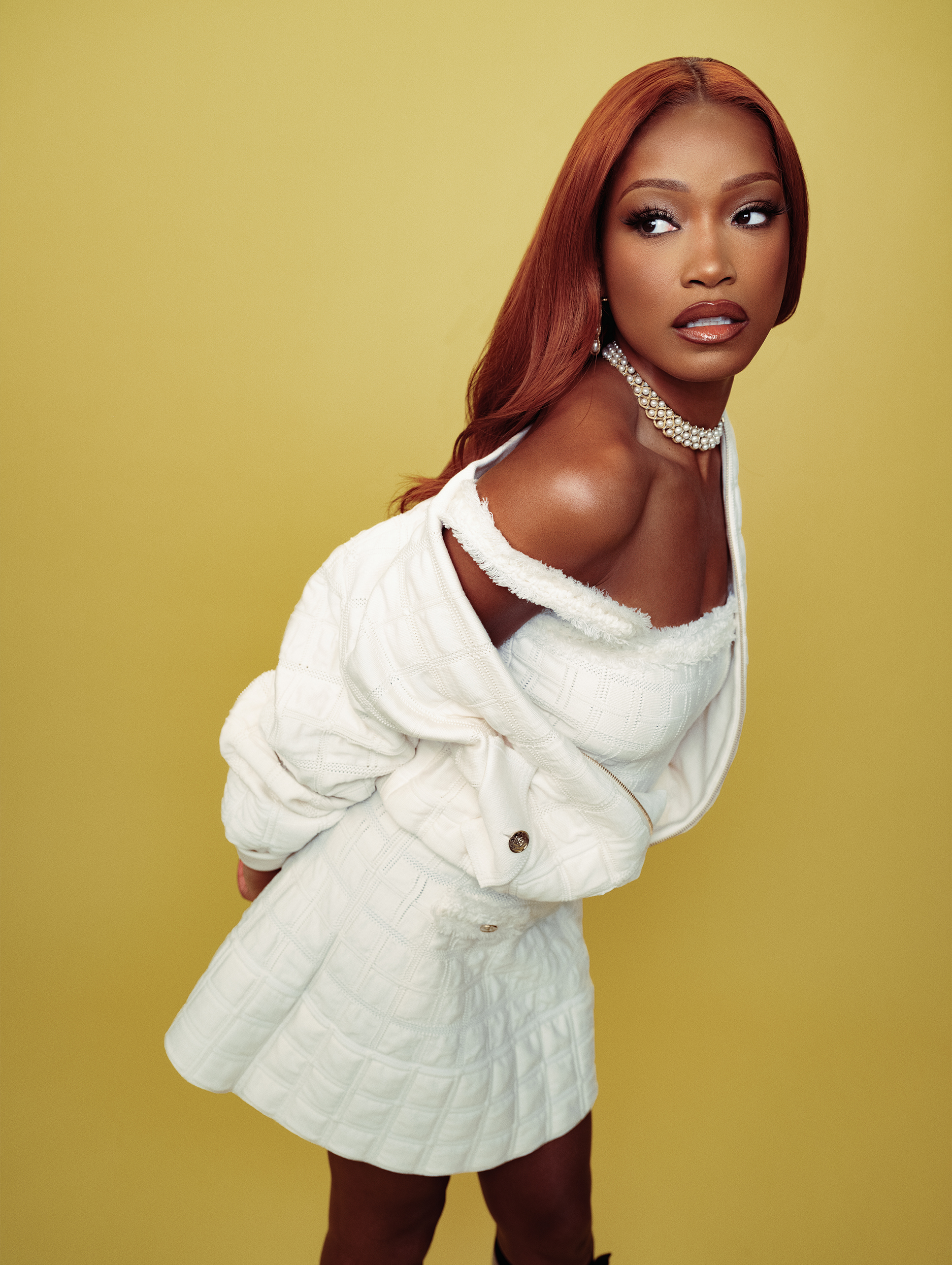
Referring back to her split from Jackson and becoming a parent, she adds, "What's so interesting is that after everything happened, I almost felt more open to being dressed up, to escaping into an idea of someone much more glamorous, someone outside of what I was existing in, especially in the daily life of being a mom and the breastfeeding and just feeling unlike yourself. I was 50 pounds heavier. I just felt so not me. Being glamorous became a sense of finding my way back to myself and back to a stronger, more confident version of who I was before."
As Keke Palmer continues to evolve, she is redefining what it means to navigate the complexities of fame while staying true to herself. She's no longer just performing for the world; she's found a way to carve out space where she isn't confined to the expectations of the industry. In her quest to live authentically, she's proving that true power lies in embracing all our parts—imperfections and all.
Photographer: Blair Caldwell
Stylist: Zerina Akers
Hairstylist: Kira Hameed
Makeup Artist: Kenya Alexis at Opus Beauty
Manicurist: Chyna Andre
Prop Stylist: Ali Gallagher
DP: Sam Miron
Jessica Herndon is an award-winning entertainment journalist, content and brand strategist, media coaching expert, and filmmaker who has covered music, television, film, fashion, beauty, fitness, and contemporary art.